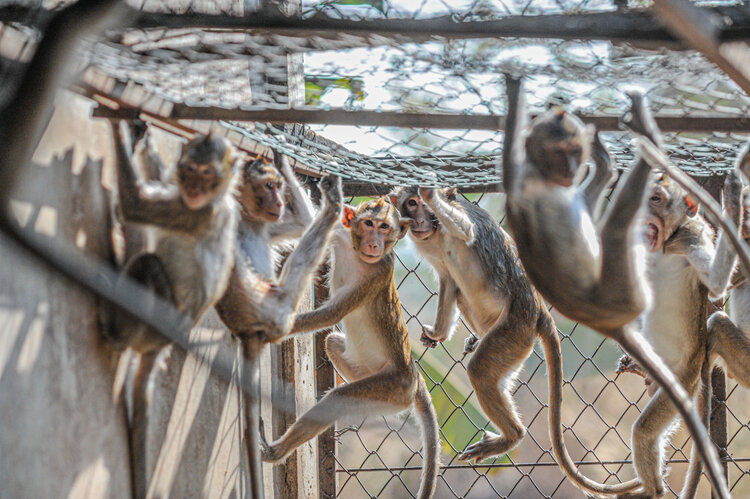“To Prevent The Next Pandemic, It’s The Legal Wildlife Trade We Should Worry About”, Says Wildlife Expert
With the pandemic shining a spotlight on the illegal wildlife trade, experts are urging that we also tackle the millions of unchecked legal live animals that enter the U.S. each year.
Monkeys at a breeding facility in Laos. Monkeys like these are shipped around the world as part of the legal wildlife trade, for use in biomedical tests. Credit: Jo-Anne McArthur / We Animals
The current pandemic has brought the likes of wet markets and the illegal wildlife trade under increased scrutiny - particularly their role in helping to spread zoonotic diseases such as COVID-19.
While governments around the world are being urged to tackle this illegal wildlife trade to prevent the next pandemic, one wildlife expert has raised concerns about the often-overlooked legal wildlife trade.
Writing in National Geographic’s Wildlife Watch series, Jonathan Kolby, a former wildlife inspector, reveals:
“twenty thousand live bullfrogs from China that will be cooked and eaten as frog legs. Forty green monkeys from St. Kitts and Nevis for biomedical research. Three hundred giant clams from Vietnam and 30 stingrays from the Brazilian Amazon for home aquariums. That motley assortment is a miniscule glimpse of what the legal international wildlife trade might look like on a given day in any of the 41 ports of entry staffed by U.S. Fish and Wildlife Service inspectors.”
Kolby’s experiences as a wildlife inspector raise startling concerns around the lack of structures in place to prevent future pandemics caused by zoonotic diseases that jump to humans from animals.
Government reports show that the legal trade in wildlife and wildlife products imported $4.3 billion-worth into the U.S. during 2019 alone. Contained in that figure are around 200 million live animals imported to the U.S. each year, ranging from fish and birds to reptiles and spiders. These animals are destined for businesses including aquariums and the pet trade.
Startlingly, these millions of live animals largely go unchecked for diseases when they enter the U.S..
As Kolby explains, “with few exceptions, the U.S. has no laws specifically requiring disease surveillance for wildlife entering the country, and the vast majority of wild animal imports are therefore not tested.”
“The diseases that hitchhike into the country on legally imported wildlife continue to go largely unnoticed”, he adds.
The coronavirus pandemic has exposed so many of the problems that exist in our current systems because they so heavily involve animals - animals that have a major role in spreading zoonotic diseases like COVID-19. The call to change our attitudes and behaviours towards animals and wildlife seem more urgent than ever.
Read Jonathan Kolby’s full piece in National Geographic here.
Species Unite
A collection of stories of those who fight the good fight on behalf of animals.

